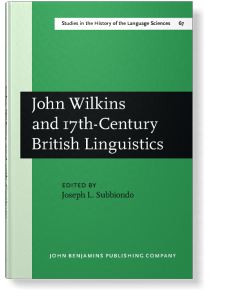John Wilkins and 17th-Century British Linguistics
Editor
In this reader, 19 articles have been collected that bring out the central position of John Wilkins and his Essay Toward a Real Character, and a Philosophical Language (1668) in the history of ideas in 17th-century Britain.
[Studies in the History of the Language Sciences, 67] 1992. xvi, 376 pp.
Publishing status:
© John Benjamins Publishing Company
Table of Contents
-
Editor's Introduction | p. XIII
-
Acknowledgements
-
I. John Wilkins (1614-1672): Life and Work
-
John WilkinsHans Aarsleff | p. 3
-
II. Wilkins and the 17th-century Reconciliation of Science, Religion, and Language
-
John Wilkins' Essay Toward a Real Character: Its place in the seventeenth century epistemeSidonie Clauss | p. 45
-
Dr. Wilkins and the Royal SocietyDorothy Stimson | p. 69
-
The Ross-Wilkins ControversyGrant McColley | p. 95
-
John Wilkins and the Royal Society's Reform of Prose StyleFrancis Christensen | p. 133
-
III. The Sources of Wilkins' Philosophical Language
-
Comenius and the Real Character in EnglandBenjamin DeMott | p. 155
-
The Sources and Development of John Wilkins' Philosophical LanguageBenjamin DeMott | p. 169
-
On the Sources of John Wilkins' Philosophical LanguageOtto Funke | p. 183
-
Language Universals and 17th-Century Universal SchemesDavid Cram | p. 191
-
IV. Theory and Practice in Wilkins' Philosophical Language
-
'Philosophical' Grammar in Wilkins' EssayVivian Salmon | p. 207
-
On the Project of a Universal CharacterJonathan Cohen | p. 237
-
The Real Character of Bishop WilkinsEdward Neville da Costa Andrade | p. 253
-
Wilkin's Natural Grammar: The verb phraseThomas Frank | p. 263
-
V. Wilkins' Classification of Reality
-
John Wilkins and Noah's ArkClark Emery | p. 279
-
John Wilkins' Linguistic ViewsSergey Semenovich Linsky | p. 285
-
John Wilkins' Theory of Meaning and the Development of a Semantic ModelJoseph L. Subbiondo | p. 291
-
John Wilkins' and William Lloyd's Alphabetical Dictionary (1668): Towards a comprehensive, and systematically defined, lexiconFredric Dolezal | p. 309
-
The Significance of John Wilkins in the History of Bibliographical ClassificationB.C. Vickery | p. 329
-
VI. Wilkins' Legacy
-
John Wilkins' Essay (1668): Critics and continuatorsVivian Salmon | p. 349
-
Select Biography
-
A. Writings by John Wilkins | p. 365
-
B. Secondary Sources | p. 366
-
Index of Biographical Names
Cited by (17)
Cited by 17 other publications
Cram, David
O’Neil, Sean
Yáñez-Bouza, Nuria
Jones, William Jervis
2010. Dictionaries in Early Modern Europe: Lexicography and the making of heritage. By John Considine. Historiographia Linguistica 37:1-2 ► pp. 214 ff. 
Maun, Ian
Poole, William
Velarde Lombraña, Julián
2000. El Español en los proyectos de lengua universal. Historiographia Linguistica 27:1 ► pp. 59 ff. 
Mikosz, David
Lauzon, Matthew J.
1996.
Language and the History of Thought. Edited by Nancy Struever. Historiographia Linguistica 23:3 ► pp. 445 ff. 
Nate, Richard
1996. The interjection as a grammatical category in John Wilkins’ philosophical language. Historiographia Linguistica 23:1-2 ► pp. 89 ff. 
Abercrombie, David
1993. William Holder and other 17th-century phoneticians. Historiographia Linguistica 20:2-3 ► pp. 309 ff. 
Koerner, Konrad & Kofi K. Saah
1992. Publications received / Ouvrages reçus / Eingegangene schriften. Historiographia Linguistica 19:1 ► pp. 199 ff. 
Subbiondo, Joseph L.
Subbiondo, Joseph L.
Subbiondo, Joseph L.
This list is based on CrossRef data as of 18 july 2024. Please note that it may not be complete. Sources presented here have been supplied by the respective publishers. Any errors therein should be reported to them.
Subjects
Linguistics
Philosophy
Main BIC Subject
HP: Philosophy
Main BISAC Subject
PHI000000: PHILOSOPHY / General
